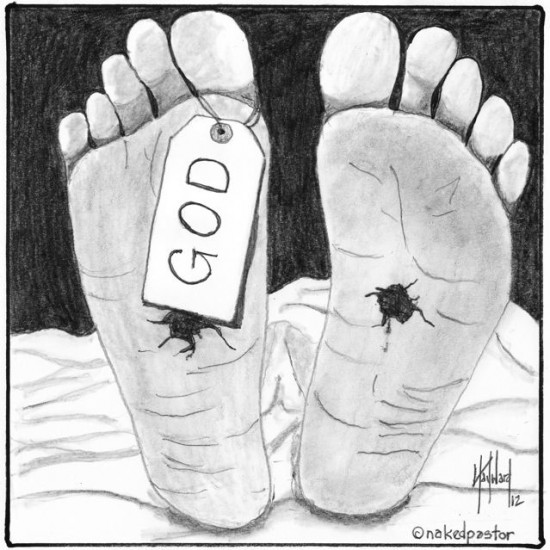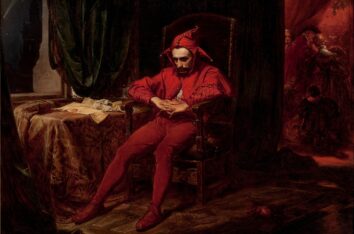 I have been reading a bit of Irish philosopher/theologian Peter Rollins recently, as well as listening to some of his talks on YouTube. His reading of the Christian tradition is quite radical and subversive, and I am not convinced I have really “gotten” him quite yet. In an effort to further that along, then, I wanted to try to articulate his basic position as best I can (because that, for me, is the best barometer for knowing how well I actually understand something).
I have been reading a bit of Irish philosopher/theologian Peter Rollins recently, as well as listening to some of his talks on YouTube. His reading of the Christian tradition is quite radical and subversive, and I am not convinced I have really “gotten” him quite yet. In an effort to further that along, then, I wanted to try to articulate his basic position as best I can (because that, for me, is the best barometer for knowing how well I actually understand something).
Mankind is born with a sense of lack (of which a child becomes aware once he develops self-consciousness — it usually manifests itself as a fear of detachment from his mother). This desire for the other Rollins calls idolatry, for it is a desire for that thing out there that will ultimately satisfy us and give our lives meaning. This stems from the doctrine of original sin.
The biggest idol that man can desire is God, for he is presented to us as that which can, unlike all the false promises of the world such as fame, money, or power, really and truly satisfy us. In this schema God is the one who can bestow ultimate meaning, and the cross of Christ is the way to get us there (we’re all quite familiar with this idea, I’m sure).
But according to Rollins, both certainty and satisfaction are illusions, idols that we can never possess. The central point of the cross, rather, is Jesus’ cry of dereliction: “My God, my God, why have You forsaken me?” In this moment, Christ “became sin” in that he experienced in himself the lack, the loss that I described above. In his crucifixion, then, Christ did not capitulate to the existing system either by making possible a new tribal identity alongside all the other options out there (like Jew, Gentile, male, female, bond, or free), or by making some sort of payment to the Father to cover the debt of our sins. Rather, he utterly obliterated the existing paradigm, smashing it to pieces forever.
As crucifixion gives way to resurrection, Rollins appeals (interestingly) to the old nineteenth-century magicians and compares what they did to the Eucharist (noting that “hocus pocus” originally derived from “hoc est corpus,” the priest’s words meaning “this is my body”). A traditional magic trick, he says, consisted of three parts: the Pledge (“Here is a coin”), the Turn (“I rub the coin into my arm and make it disappear”), and the Prestige (“But look, here it is underneath this glass of water on the table”). But as we all know, what we get back is not the same as what originally disappeared — it’s similar (a coin), but different (it’s not the same coin, but was placed under the glass before the trick began). We experience the resurrection, therefore, in that we eat the Eucharist (the Turn) and live out the Prestige as we embody God to the world in our love for our neighbor, the stranger, and the other.
Thus God, according to Rollins, does not “exist,” properly speaking. He doesn’t “stand out” (which is what existence means). He is not meaningful or there to be experienced. He illustrates this by appealing to light: light is not seen or experienced, but it provides the context in which everything else is seen and experienced. God is love, and “love vaunteth not itself,” does not draw attention to itself, but rather focuses on the other. Here is a summary of Rollins’ thoughts on this, transcribed from the video below:
In the resurrection we experience the death of God as idol, as product, as that thing that will satisfy us, and we find a different notion of God, where God is love. Love does not “exist,” it calls everything into existence. Love is not sublime, love is not beautiful, love is not wonderful. Love says, “Look at that person. They are sublime, they are beautiful, they are wonderful.” Love is not meaningful. Love is what renders the world meaningful. When we say that God is love, we mean that the only way to experience God is by sensitizing ourselves to one another, by getting our hands dirty, and by embracing the world.
In the act of laying down our lives we find them. In laying down the idea that we can be happy and just trying to live as humans, we find a form of happiness. It may not be the ecstatic happiness promised by the idol, but it’s one that is intensely beautiful and intensely deep. It’s the place you go for the freedom from the pursuit of happiness.
We need a form of Christianity that reflects and opens us up to our brokenness, that helps sensitize us to the people to our right and to our left, that helps open us up to our darkness and our suffering, not so that we dwell within it, but so that in the midst of it we find healing.
Rather than a belief system, Christianity for Rollins is a new way of living in the world, one which pays little attention to itself but rather is reflected in the love of neighbor that, according to Jesus, is what fulfills the law and the prophets.
Thoughts?
(To get to the relevant section, either scroll ahead to 46:10 or click here.)




It is interesting. I don’t like the way he talks about God. However, I do like the way his thinking leads him to a rejection of tribalism, and embrace of love.
Also, I as well utterly reject the prosperity gospel. Thus I don’t expect God to reward me at all in this life. I recognize that I could be “Job-ed” at any time. I just pray that I would love God regardless. Is this the same as not making God an idol in his thought? I don’t know. I’m also reminded of chapter 8 of the Little Flowers of St.Francis, about what is true joy. It is really short, https://www.ewtn.com/library/MARY/flowers1.htm
If he is saying that God shouldn’t be an object of our love, I reject that. Putting dogma aside, I don’t see how this line of thought would even accomplish the noble goals he has proposed for this new Christian form. I believe, you must love Love to be able to put aside yourself and love your neighbor properly. You must ground your beliefs in the transcendent to live the way he proposes. However, he seems to deny the transcendent. This robs the power of the Christian religion, and underminds any benefits of the system of belief.
But maybe I completely misunderstand him.
Hey Lane,
I agree that his approach is disturbing (which I think is his point).
What I appreciate about his overall message is that it not makes OK, but actually makes necessary what so many experience of the Christian faith, myself included. Until you have existentially participated in the cross and the death-of-God-as-idol that it entails, the faith will never really be authentic.
As far as God being “an object of our love,” for Rollins that’s like asking if our eyes are objects of our sight. No, they’re not, they’re the things that make sight possible.
Anyway, I’d be curious to hear your thoughts on the entire lecture if you ever get the time to listen.
Yep. 🙂
“The biggest idol that man can desire is God, for he is presented to us as that which can, unlike all the false promises of the world such as fame, money, or power, really and truly satisfy us.”
Man makes God into an idol. Profound. If this is true, and I believe it can be true, then man, you, me, we have erred. A byproduct is to think that He can truly satisfy us. What a grave mistake to think that in this life, Christian or non Christian, can be satisfied. I always like CS Lewis’ treatise on why we have pleasure and or experience moments of satisfaction. But for a Christian to actually declare as Biblical truth that we are a satisfied bunch, is total rubbish.
Jason,
Well, it definitely grabs your attention!
Sounds like a “test of faith”. If your faith is tied to some sort of reward, especially in this life, I will agree that the authenticity (or maturity) of your faith might need to be questioned. But what about the reward in the next life? Are you willing to live your life of sacrificial love, for the sake of that love alone, even if it turns out that there is no reward now or in the next life? Loving love for love’s sake alone.
Interesting. I will have to find time to watch the lecture.
Samuel,
Right! I can attest that I absolutely ache for God and all that He represents (Love, Beauty, Goodness, Truth…).
Sam,
Agreed. Unfortunately it usually takes a person getting a bit older and a bit more disillusioned before he will be capable of admitting this!
Lane,
My desire is to live in such a way as have no regrets no matter what happens in the next life. If on the last day God goes, “Turns out it was the JWs, they were right all along,” I hope I can respond by pointing out that I was pretty cool to them while on earth, despite how annoying they always were.